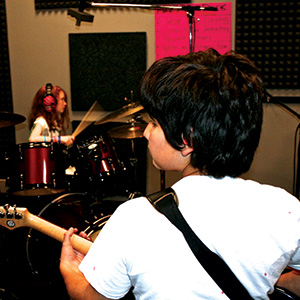
As I cross the threshold at School of Rock San Jose on Almaden Expressway, a wall of photos greets me: Kids engrossed in real-life rock & roll action shots, either on stage or in rehearsal rooms, playing bass, guitar, keys and even singing into microphones. Everyone seems to be having a rocking good time.
The rest of the lobby is business-y, but rocking. Over in the far corner, comfy leather-looking chairs occupy the floor, right in front of a Photoshop-filtered Angus Young image converted to a School of Rock poster. A check-in desk sits at the opposite side, where a few parents are signing up their kids to take lessons. There are potted plants, brand new flooring, plus School of Rock T-shirts and other merch on a clothing rack. I can hear snare drums and the laughs of children coming from somewhere down the hallways.
As I then skulk down those hallways, I see framed Agent Orange, Joan Jett and Creedence LPs gracing the walls, just outside the lesson rooms, of which there are many. I even get to prowl through two rehearsal rooms, replete with instruments, mics and soundproofing material. Throughout the building, I can hear kids running through Nirvana riffs, Concrete Blonde, as well as a complete group doing “I Melt With You” by Modern English.
A chain with locations throughout the world, School of Rock teaches guitar, bass, keys, drums and vocals to kids ages 6-18. Erik Delicath and his wife, London, opened the San Jose franchise last October in a location formerly occupied by Computerland, across the parking lot from the Almaden Britannia Arms. What differentiates School of Rock from most other music schools is that kids of all different skill levels immediately jam together. As a result, London tells me, they learn faster and have a lot more fun than if they were just taking solo lessons.
“Even as absolute beginners, we get all the kids playing together right away,” says London. “Because if you’re lucky enough to have music in your school when you’re playing with other kids, it’s usually band instruments. So with guitar, bass, or drums, you’re usually taking private lessons, then you go home and sit on your bed and play. So what we’re striving to create is a place where they can come and be real musicians, work on rhythm, timing, communication, cooperation and all the stuff that comes along with playing with other people.”
Because of this, kids become better team players and better equipped to deal with any feelings of isolation, loneliness or disenfranchisement that may emerge later in life. Not that I’m speaking from experience.
“The kids who are shredders learn how to be mentors and be gracious when we put an absolute newbie in with them,” London tells me. “The new kids have someone they can look up to and aspire to. And they tend to come along a lot faster than if we had separated them or isolated them by levels of experience. We mix them all together by design.”
I can testify about all of this. I grew up with music in elementary school and I later took lessons for years, right down the street from where School of Rock now sits, but I hardly ever jammed with other people at that age. Looking back on it, I can say with all degree of certainty that doing so would have dramatically helped me, both musically, and in life. And it took prowling the hallways—in a building where people came to purchase SCSI cables at Computerland 20 years ago—to make me realize this. These kids I overheard in the rooms were awesome, perhaps already better than the cover bands who play at the Brit across the parking lot.
The kids from School of Rock San Jose have already staged one show. Their next one, a spring show, will erupt June 6 at the Montgomery Theater, benefiting the Boys & Girls Clubs of Silicon Valley. Proceeds will go toward on-site music instruction at the Gardner Community Center Clubhouse.
“Our goal is to bring music into the lives of as many kids as possible,” London says.




